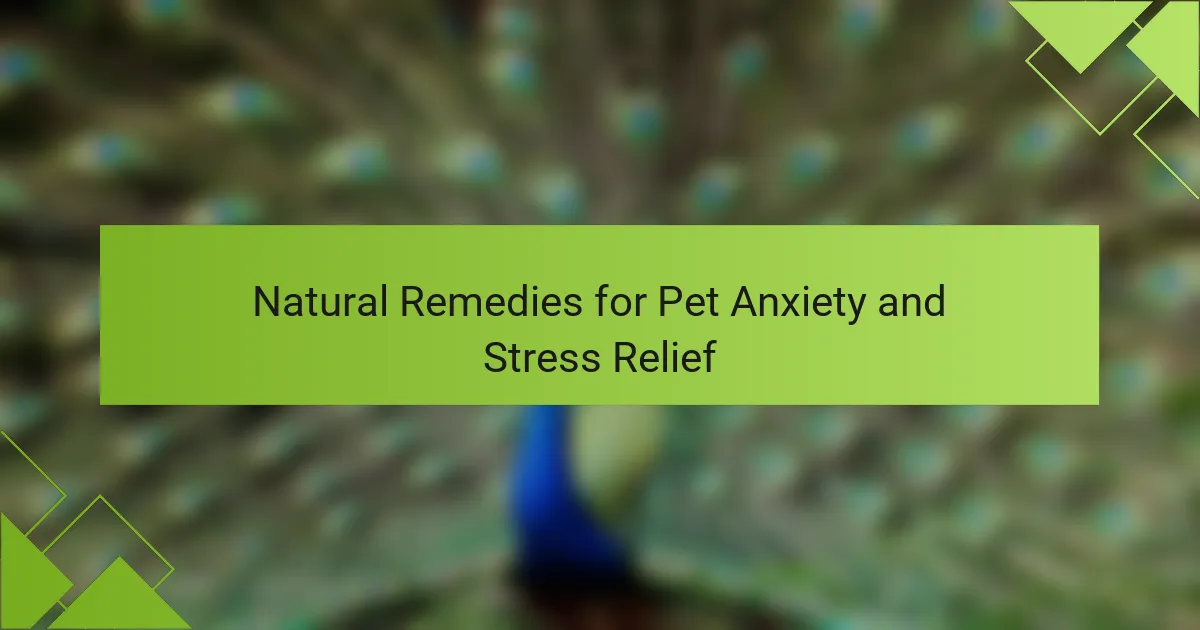Pet anxiety can significantly impact your pet’s well-being, leading to behaviors like excessive barking and destructive actions. Natural remedies, including herbal supplements and aromatherapy, can effectively alleviate stress. Behavioral techniques, such as training and creating safe spaces, further enhance your pet’s emotional stability. Regular exercise also plays a crucial role in reducing anxiety and improving overall mood.

What are the signs of anxiety in pets?
Signs of anxiety in pets include excessive barking, destructive behavior, hiding, pacing, and changes in appetite. These behaviors indicate stress and discomfort. Monitoring your pet’s behavior helps identify anxiety triggers. Natural remedies, such as calming herbs and pheromone diffusers, can effectively alleviate these symptoms.
How does anxiety manifest differently in dogs and cats?
Anxiety manifests differently in dogs and cats, with dogs displaying more overt signs like barking and pacing, while cats often hide or exhibit subtle changes in behavior. Understanding these differences is crucial for effective natural remedies for pet anxiety and stress relief.
Dogs typically show anxiety through physical actions such as excessive barking, whining, or destructive behavior. They may also follow their owners closely or exhibit signs of restlessness. In contrast, cats may demonstrate anxiety through withdrawal, hiding, or changes in grooming habits. Some may even engage in excessive meowing or litter box avoidance.
Natural remedies can include herbal supplements, calming pheromones, and environmental enrichment. For dogs, products containing valerian root or chamomile can help reduce anxiety. For cats, catnip or calming sprays can create a more soothing environment.
Recognizing these unique manifestations allows pet owners to tailor their approach to anxiety relief effectively. Addressing the specific needs of each species enhances the overall well-being of pets experiencing anxiety.
What environmental factors contribute to pet anxiety?
Environmental factors contributing to pet anxiety include loud noises, changes in routine, and lack of social interaction. These stressors can trigger fear responses in pets, leading to anxiety. For example, thunderstorms or fireworks often induce stress due to their loud and unpredictable nature. Additionally, moving to a new home or changes in family dynamics can disrupt a pet’s sense of security, exacerbating anxiety. Finally, inadequate exercise and mental stimulation can lead to pent-up energy, increasing stress levels.

Which natural remedies are effective for pet anxiety?
Natural remedies for pet anxiety include herbal supplements, aromatherapy, and behavioral techniques. These methods can effectively reduce stress in pets.
Herbal supplements like chamomile and valerian root promote relaxation. Aromatherapy using lavender oil can create a calming environment. Behavioral techniques such as training and desensitization help pets adjust to stressors.
Each remedy offers unique benefits. For example, chamomile reduces anxiety without sedation, while lavender oil can enhance sleep quality. These natural options provide safe alternatives to pharmaceuticals for managing pet anxiety.
How do herbal supplements help alleviate stress in pets?
Herbal supplements can effectively alleviate stress in pets by promoting relaxation and reducing anxiety. Ingredients like chamomile and valerian root are known for their calming properties. These natural remedies can help pets cope with stressful situations, such as thunderstorms or travel. Additionally, certain herbal blends may enhance overall well-being, improving mood and behavior.
What role do essential oils play in calming anxious pets?
Essential oils can significantly calm anxious pets through their soothing scents. These natural remedies promote relaxation and reduce stress in animals. Lavender oil, for example, is known for its calming properties and can help lower heart rates in pets. Additionally, chamomile and cedarwood oils also contribute to anxiety relief. Using a diffuser or diluting oils in a carrier can safely deliver these benefits, creating a serene environment for pets.
Which dietary changes can support pet mental health?
Dietary changes can significantly enhance pet mental health by incorporating specific nutrients and natural remedies. Increasing omega-3 fatty acids, found in fish oil, can reduce anxiety. Adding probiotics supports gut health, which is linked to mood regulation. Herbal supplements like chamomile and valerian root offer calming effects. Including high-quality protein sources ensures adequate amino acids for neurotransmitter production. Lastly, maintaining a consistent feeding schedule contributes to a sense of security and stability for pets.

How can physical activity reduce pet anxiety?
Physical activity can significantly reduce pet anxiety by promoting the release of endorphins and providing mental stimulation. Regular exercise helps pets expend excess energy, which can alleviate stress and improve overall mood. Engaging in activities like walking, playing fetch, or interactive games fosters a sense of security and strengthens the bond between pets and their owners. As a result, pets experience lower anxiety levels and improved behavior.
What types of exercises are best for anxious dogs?
Engaging anxious dogs in physical activities can significantly alleviate their stress. The best types of exercises include structured walks, interactive play sessions, and agility training.
Structured walks provide mental stimulation and help dogs adapt to their environment. Interactive play, such as fetch or tug-of-war, fosters bonding and distracts from anxiety triggers. Agility training challenges dogs physically and mentally, improving confidence and focus.
Incorporating these exercises into a daily routine can enhance a dog’s well-being, reducing anxiety levels effectively.
How does playtime impact a pet’s stress levels?
Playtime significantly reduces a pet’s stress levels. Engaging in regular play helps pets release pent-up energy and fosters mental stimulation. This interaction promotes a sense of security and happiness, which can alleviate anxiety. Studies show that pets who play frequently exhibit lower cortisol levels, indicating reduced stress. Additionally, social play with humans or other pets enhances bonding, further contributing to emotional well-being.

What are the benefits of behavioral training for anxious pets?
Behavioral training for anxious pets provides numerous benefits, enhancing their overall well-being. It builds confidence, reduces anxiety, and fosters a stronger bond between pet and owner.
Training techniques, such as positive reinforcement, help pets learn coping mechanisms. This approach decreases stress-related behaviors, leading to a calmer demeanor. As a result, pets may experience improved social interactions and reduced fear responses.
Additionally, consistent behavioral training can promote mental stimulation. Engaging pets in learning activities can distract them from anxiety triggers. This practice supports their emotional health and encourages a more balanced lifestyle.
In summary, behavioral training is a vital component of natural remedies for pet anxiety. It not only addresses immediate stress but also contributes to long-term emotional stability.
How can positive reinforcement techniques help?
Positive reinforcement techniques effectively reduce pet anxiety and stress by encouraging desired behaviors. These techniques involve rewarding pets for calmness or good behavior, which reinforces positive associations. For example, treats, praise, or playtime can motivate pets to remain relaxed in stressful situations. As a result, consistent use of positive reinforcement can lead to a more confident and less anxious pet over time.
What training methods are particularly effective for specific breeds?
Certain training methods effectively address anxiety in specific breeds. For example, positive reinforcement works well with Labrador Retrievers, while structured routines benefit Border Collies.
Training methods such as desensitization and counter-conditioning can help anxious breeds like German Shepherds. Socialization exercises are particularly effective for breeds prone to anxiety, such as Chihuahuas.
Tailoring training to the breed’s unique traits enhances effectiveness. Understanding these nuances leads to better stress relief for pets.

Which calming techniques can pet owners implement at home?
Pet owners can implement various calming techniques at home to alleviate pet anxiety and stress. These methods include creating a safe space, using calming music, and introducing aromatherapy.
Creating a safe space involves designating a quiet area with familiar items like blankets or toys, offering pets a retreat during stressful situations. Calming music has been shown to reduce stress levels in pets, providing a soothing environment. Aromatherapy, utilizing pet-safe essential oils like lavender, can further promote relaxation.
Additionally, engaging in regular exercise helps release pent-up energy, reducing anxiety. Training sessions using positive reinforcement can also build confidence and reduce stress in pets.
How can creating a safe space help reduce anxiety?
Creating a safe space significantly reduces anxiety in pets. It fosters a sense of security, allowing them to relax. Safe spaces can include cozy beds, quiet areas, or designated rooms. These environments help mitigate stress triggers and promote calm behavior. As a result, pets experience lower anxiety levels and improved overall well-being.
What are the benefits of routine and structure for pets?
Routine and structure significantly benefit pets by reducing anxiety and stress. Regular schedules provide predictability, helping pets feel secure in their environment. Consistent feeding, exercise, and playtimes contribute to emotional stability and overall well-being.
Establishing a daily routine can lead to better behavior, as pets learn what to expect. For example, dogs thrive on regular walks and training sessions, which can alleviate destructive behaviors caused by anxiety. Cats also benefit from structured playtimes, promoting physical activity and mental engagement.
Moreover, routines can aid in identifying unusual behaviors or health issues early. When pets have a consistent schedule, any deviations may signal stress or discomfort, allowing for timely intervention.

What unique attributes do certain natural remedies offer?
Certain natural remedies for pet anxiety and stress relief offer unique attributes that enhance their effectiveness. For example, chamomile is known for its calming properties, while valerian root can promote relaxation. Additionally, CBD oil has gained attention for its potential to reduce anxiety without psychoactive effects. Each remedy provides distinct benefits, making them suitable for various pet needs.
How do specific herbs differ in their approach to anxiety relief?
Different herbs offer unique mechanisms for relieving anxiety in pets. For example, chamomile contains apigenin, which binds to brain receptors to induce calmness. Valerian root acts as a mild sedative, promoting relaxation without heavy sedation. Lavender is known for its soothing aroma, which can reduce stress levels. Each herb’s effectiveness may vary based on the pet’s individual response and specific anxiety triggers. Understanding these differences helps pet owners choose the most suitable natural remedy for their furry companions.
What rare ingredients are emerging in the pet wellness market?
Emerging rare ingredients in the pet wellness market include ashwagandha, chamomile, and hemp-derived compounds. These ingredients offer unique benefits for anxiety and stress relief in pets. Ashwagandha is known for its adaptogenic properties, helping to regulate stress responses. Chamomile provides calming effects and may improve sleep quality. Hemp-derived compounds, particularly CBD, are gaining attention for their potential to reduce anxiety without psychoactive effects. These ingredients represent a shift towards holistic approaches in pet wellness, focusing on natural remedies.

How can pet owners monitor the effectiveness of natural remedies?
Pet owners can monitor the effectiveness of natural remedies by observing behavioral changes and tracking symptoms. Keeping a journal helps note progress over time. Regular veterinary check-ups provide professional assessments. Additionally, using anxiety scales can quantify improvements in pet behavior.
What signs indicate that a remedy is working?
Signs that a remedy for pet anxiety is working include noticeable behavioral improvements, such as reduced barking, calmer demeanor, and increased relaxation. Owners may observe their pets engaging more with their environment and showing less fear or aggression. Additionally, consistent use of natural remedies should result in a gradual decrease in stress-related symptoms, such as excessive grooming or hiding. Monitoring these changes can help ensure the remedy is effective and beneficial for the pet’s overall well-being.
How can pet owners adjust their approach if remedies are ineffective?
Pet owners should consider alternative strategies if natural remedies fail. First, assess the specific anxiety triggers in your pet. Then, consult a veterinarian for tailored advice. Incorporating behavior modification techniques can also enhance results. Finally, explore additional treatments such as pheromone diffusers or calming supplements.
What expert tips can help optimize natural anxiety relief for pets?
To optimize natural anxiety relief for pets, consider these expert tips. Use calming herbal remedies like chamomile or valerian root. Create a safe space with familiar scents and soft bedding. Implement regular exercise routines to reduce stress. Practice desensitization techniques to ease anxiety triggers.
